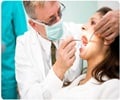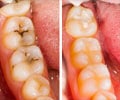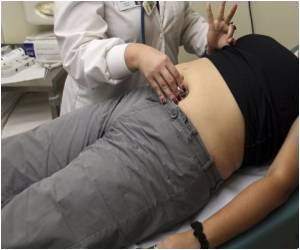- Pregnancy and Oral Health - (https://www.cdc.gov/oralhealth/publications/features/pregnancy-and-oral-health.html)
- Pregnancy - (https://www.ada.org/resources/research/science-and-research-institute/oral-health-topics/pregnancy)
- Dental Care is Safe and Important During Pregnancy - (https://www.cdc.gov/oralhealth/infographics/dental-care-pregnancy.html)
- Treating pain during pregnancy - (http://www.ncbi.nlm.nih.gov/pmc/articles/PMC2809170/)
About
Life blossoms like the branch of a tree when you decide to have a baby. Your joy knows no bounds when a new life begins stirring inside you and a tiny heartbeat is heard for the first time. Soon the butterflies in your tummy will turn into real hands and feet.
After all, a baby is God’s way of telling that life must go on. Your baby's playful kick happily reminds you that you are not alone. Very soon, your baby will come as a precious fruit of that tree. The feeling of delivering a baby is momentous, it's simply priceless!
Proper nutrition is the cornerstone to healthy pregnancy. In addition to eating and drinking well, you must also pay attention to maintaining good oral health. Women who are pregnant, or are thinking of becoming pregnant, should make it a point to see a dentist, who will demonstrate proper teeth cleaning and flossing techniques as well as explain the importance of good oral hygiene for you and your baby.
Sweet Cravings
From ultrasounds and cravings to mood swings and weight gain, pregnancy shakes up a lot of things. Different kinds of cravings are quite common during pregnancy, either in the first, second or third trimester. So whether you are craving those candies or the pickled peanut butter sandwiches, remember that the more frequently you snack, the greater are the chances of developing tooth decay. So try and avoid sugary snacks if possible(1✔ ✔Trusted Source
Pregnancy and Oral Health
Go to source).
Common Dental Conditions that Affect pregnant women
During pregnancy, many women experience nausea and vomiting or "morning sickness"; the stomach acids resulting from the vomiting process could affect enamel- the outermost protective coating of the teeth. It is also thought that changes in hormone levels during pregnancy could also allow bacteria to grow in the mouth more easily, thus leading to gingivitis.
Periodontal Disease and Pregnancy Gingivitis
A woman undergoes a lot of physiological change when she is pregnant. The major change is the fluctuation of hormones which make her susceptible to oral infections such as periodontal disease. A large number of studies have shown an association between periodontal disease and negative health outcomes such as tooth loss, cardiovascular disease, poor diabetes control and unwanted birth outcomes.
One study reportedly found that moderate-to-severe periodontal disease early in pregnancy was associated with delivery of small-for-gestational-age infants. Other studies have also found a correlation between periodontal disease and pre-eclampsia and preterm births.
A pregnant woman has 40% more fluid in her body as compared to normal adults. This increases the amount of fluid in all the cells of the body, including the gum tissues, which causes them to become swollen, tender and bleed easily when brushed. This condition of the gum tissues is known as pregnancy gingivitis.
These enlarged blood vessels in the gums are more reactive to the toxins produced by plaque bacteria. Teeth should be carefully cleaned in such situations to avoid potential bleeding. Flossing your teeth should be done on a regular basis as recommended by your doctor.
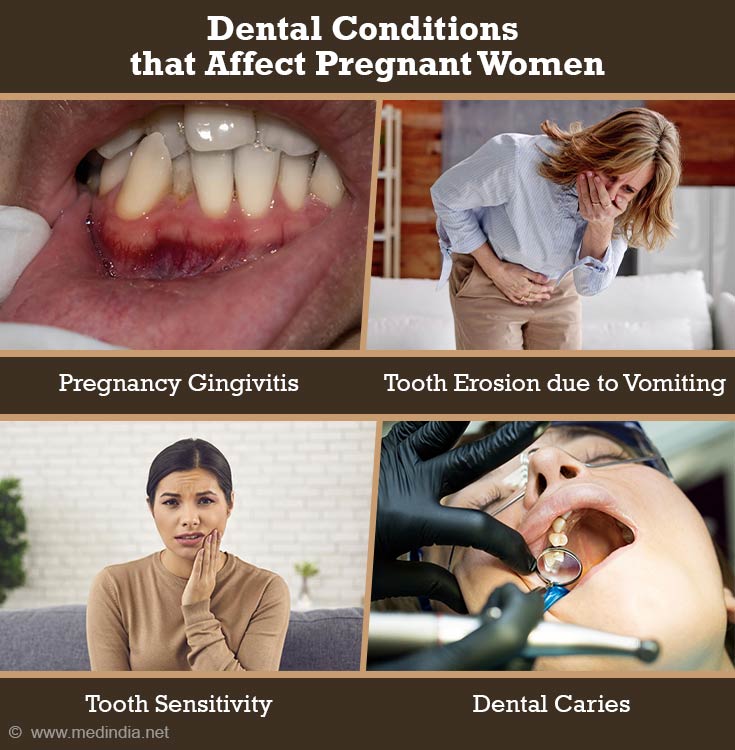
Tooth Erosion
Morning sickness, which is a common experience for many women in the early months of pregnancy, causes tooth erosion. This could progress to teeth sensitivity problems like heat and cold sensitivity and eventually tooth decay. For many pregnant women, brushing their teeth precipitates nausea and vomiting; however, on the flip side, not brushing regularly increases risk of tooth erosion.
Try using a brush with a small head, like the kind you would buy for your toddler. Ask your dentist for options like bland-tasting toothpaste during pregnancy. Rinse your mouth out with water or a fluoride mouth rinse or sodium bicarbonate if you suffer from morning sickness and have bouts of frequent vomiting. This protects your teeth from the harmful effects of stomach acids.
Dental Caries
Tooth decay eventually leads to development of cavities if not treated promptly. Infants are not born with bacteria that cause their tooth decay; they usually acquire these bacteria from their mother before the age of three. Statistics show that children whose mothers have bad oral health are five times as likely to have poor oral health.
The usual ways of transmitting bacteria from mother to child are through kissing, cleaning off a pacifier using your mouth, or allowing the infant to put a hand inside your mouth. Tooth decay or cavity in children could not only be painful to them, but could also lead to low self-esteem, poor weight gain or growth, and in general, increase the financial burden on the family.
Dentists usually perform essential treatments during the second trimester i.e., between the fourth and sixth months of pregnancy. Dental treatment which is not considered as an emergency is usually avoided during the first three months of pregnancy, which is when all the baby’s organs are developing. It is also deferred in late pregnancy to avoid any undue stress that could potentially induce premature labor(2✔ ✔Trusted Source
Pregnancy
Go to source).
Regular Dental Procedures during pregnancy - Is it safe?
Yes, it's a good idea to visit the dentist when you’re pregnant. According to the new recommendations issued by The American College of Obstetricians and Gynecologists, teeth cleanings and dental X-rays are safe in pregnant women.
Diana Cheng, MD, vice chair of The College’s Committee on Health Care for Underserved Women said "These new recommendations address the questions and concerns that many ob-gyns, dentists, and our patients have about whether it is safe to have dental work during pregnancy. We want ob-gyns to routinely counsel all of their patients, including pregnant women, about the importance of oral health to their overall health."
Periodontal disease is common in pregnant women. It has been known that the physical changes caused by pregnancy such as rise in hormone levels can cause the gums to swell, bleed, and trap food, causing increased irritation to the gums. Poor oral hygiene in pregnant women is also linked to preterm babies. Thus preventive dental cleanings and annual exams during pregnancy are recommended and should be done.
Dr. Cheng further added "We can all reassure our patients that routine teeth cleanings, dental X-rays, and local anaesthesia are safe during pregnancy. Pregnancy is not a reason to delay root canals or filling cavities if they are needed because putting off treatment may lead to further complications."
Pregnant women as well as those trying to conceive are advised to visit their dentist on a regular basis or at least once every 6 months(3✔ ✔Trusted Source
Dental Care is Safe and Important During Pregnancy
Go to source).
Medications used in Dental Procedures during Pregnancy
Anesthetics
Lidocaine, which is the most commonly used anesthetic for dental work, and mepivacaine are generally considered safe in pregnancy. Lidocaine is a Category B drug which does not cross the placenta after administration.
Nitrous oxide, although not contraindicated, has been shown to pose risks in pregnancy, and should be used only if deemed medically necessary after consultation with the patient's physician. The amount of anesthesia administered should be minimal so that the dental work is done, but should be enough to make you comfortable.
Antibiotics
Dental work often requires prescribing antibiotics to prevent or treat infections. Generally penicillin, amoxicillin, and clindamycin, which are category B drugs, may be prescribed after your dental procedure.
Tetracycline should never be prescribed in any form to a pregnant patient. Tetracycline has been assigned to pregnancy category D by the FDA and animal studies have revealed evidence of embryotoxic and teratogenic effect. It has been reported that when used during the second half of pregnancy i.e., during the tooth development of the baby, tetracyclines may cause permanent yellow-gray-brown discoloration of the teeth and enamel hypoplasia.
Thus tetracycline, minocycline and doxycycline should never be prescribed either in pill or topical formulation to a pregnant patient.
Another category of antibiotics that should be avoided during pregnancy is the fluoroquinolones (ciprofloxacin, levofloxacin, moxifloxacin).
Pain medications
Another common question is whether pain medications can be taken in pregnancy.
Acetaminophen:
Acetaminophen has demonstrated safety and efficacy at all stages of pregnancy in standard therapeutic doses. Studies have shown that it can be used safely without increasing risks of congenital anomalies or other adverse pregnancy outcomes.
Aspirin:
Although aspirin has not been associated with other congenital anomalies, it has been associated with increased risk of vascular disruption and can contribute to maternal and fetal bleeding.
Nonsteroidal anti-inflammatory drugs:
NSAIDs such as ibuprofen, naproxen, and ketorolac are known to relieve pain. Even short-term use of NSAIDs in late pregnancy is associated with a substantial increase in the risk of congenital cardiovascular complications, hence should be avoided in late stages.
Opioids:
These agents include morphine, hydromorphone, hydrocodone, codeine, oxycodone, tramadol etc. These are considered narcotics, which are controlled substances and illegal to use without a doctor's prescription. Since there is no known safe level of narcotic use during pregnancy, it should be used only when the benefits of the drug outweigh the potential risks. The baby should also be watched for symptoms of drug withdrawal after birth(4✔ ✔Trusted Source
Treating pain during pregnancy
Go to source).
Tips for Improving Dental Health During Pregnancy
- You should not skip your dental appointment. Regular teeth and gum examinations are very important because pregnancy causes hormonal changes that could put you at increased risk of periodontal disease and pregnancy gingivitis.
- Tell your dentist the names of all medications you are taking including any prenatal vitamins or folic acid supplement that you are taking.
- Be aware of the medications which are contraindicated in pregnancy. Antibiotics such as tetracycline can affect the development of your child's teeth and should not be taken while you are pregnant.
- Keep track of any changes in your gums that can occur during pregnancy. Report any tenderness, bleeding or swelling of your gums, promptly to your dentist or periodontist as soon as possible.
- Use a soft-bristled toothbrush while you are pregnant because your gums are more likely to bleed due to changes in your hormones and the amount of blood you have in your body. Clean your teeth regularly to avoid plaque buildup, which causes gum disease and tooth decay.
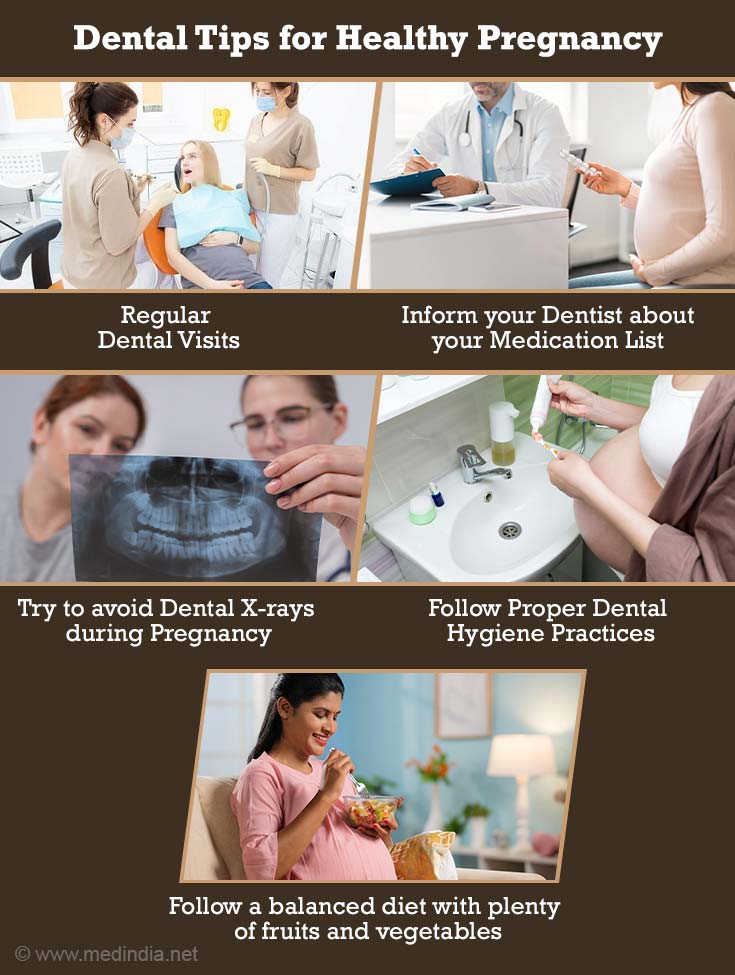
- To avoid the nausea, preferably use a bland ADA approved toothpaste and mouth rinse that contains fluoride. Avoid mouthwashes containing alcohol. Fluoride also helps to remove plaque and strengthen enamel.
- You could chew on sugarless or xylitol-containing gum. Xylitol is a sugar-free sweetener, so unlike sugar, it is not changed into acid by bacteria on the teeth.
- If possible, try to wait for some time after vomiting before brushing your teeth. If you brush right after vomiting, it could damage the protective lining of your teeth.
- Limit the amount of sugar you eat. Sugar eventually could lead to periodontal disease and tooth decay.
- Most dental X-rays don't affect the abdomen. However if possible try to avoid dental X-rays during pregnancy. You should also avoid the putting in or removal of amalgam (silver) fillings during pregnancy as a precautionary measure.
- Last but not the least, follow good oral hygiene practices to prevent and/or reduce oral health problems. Eat plenty of raw fruits, green leafy vegetables, yogurt and cheese. Nutritious foods are healthy for you and your baby.
Maintaining proper dental care during pregnancy is crucial to address various risk factors and potential complications. Neglecting oral health can lead to adverse outcomes, including heart failure, gum tissue problems, tooth loss, and bone loss.
Scientific studies in pregnant women emphasize the interconnectedness of oral health with the overall well-being, highlighting the significance of maintaining healthy blood vessels, blood flow, and immune system. While controlled studies in pregnant individuals are limited, research in animals suggests potential links between poor dental hygiene and complications such as heart valve issues, high blood pressure, and blood clotting.
Additionally, addressing concerns like bad breath, morning sickness, and gum line problems through consistent brushing and flossing can minimize risks not only to the mother but also to the developing fetus. Ultimately, prioritizing dental care during pregnancy is a proactive approach to safeguard both maternal and fetal health.
Let the good news of your pregnancy end with the delivery for a healthy baby. Take care of your health and make good healthy choices; only you can decide what is best for you and your baby.



